Manufacturing productivity on the rise - Output per worker goes south in other sectors
Published: Wednesday | September 23, 2009

Capital investments and skills-training have led to significant growth in productivity in manufacturing. - File
If data from the Jamaica Productivity Centre (JPC) are to be believed, output per worker - the popular measure of productivity - in Jamaica's much talked down manufacturing sector, outstripped average productivity in other areas of the economy by more than 1,000 per cent or 10 fold, in the period between 1998 and 2007.
Productivity is calculated by dividing total output or gross real domestic product for each sector by the total number of workers it employs.
Data released earlier this year by the JPC, an agency of the labour and social security ministry, indicates that there has been a significant increase in productivity in the manufacturing sector, a fact which officials believe, has offset massive deterioration in some sectors and stagnation in others.
Improvement
While JPC productivity specia-lists point to an overall decline in productivity in Jamaica in the 10-year period - a fact which they attribute to a low-skilled, labour-intensive approach in production - manufacturing broke out of the mould seeing a two per cent improvement each year or 20 per cent for the period.
According to the JPC, in the last survey year the Jamaican worker, on average produced $219,624 worth of goods and services. In manufacturing, they reckon the figure to be in the region of $2.4 million. This is supported by the 2008 Economic and Social Survey of Jamaica 2008, published by the Planning Institute of Jamaica.
Over the review period, productivity rose some 0.5 per cent annually for financing, insurance, real estate and business services and 0.4 per cent each year, or four per cent cumulatively, for mining and quarrying.
The leading sectors, which reflected the output per worker decline, was construction, where the measure deteriorated 2.3 per cent per annum or 23 per cent over the period.
Poor performer
The wholesale, retail, hotels and restaurant sector was another poor performer with an average annual decline of 1.4. per cent or 15 per cent for the 10 year period.
JPC officials conclude that the failure of most sectors to modernise, increase their use of technology and retrain workers, is at the root of the problem.
Dwayne Daley, senior produc-tivity specialist with JPC, notes the construction industry in particular, has been characterised by lower levels of output and rigid labour prices.
"Output has not been increasing much in the last couple of years and the fall in output has not been accompanied by a fall in labour as an input cost," he said.
While there are no productivity measures for 2008, Daley is projecting further productivity declines for 2009.
"In general output will trend down in 2009. Although labour will be reduced also, it has not done so at the rate of output and, as such, we expect to see a decline in productivity in 2009," according to the JPC representative.
A case in point is the retail sector, where Daley has pointed to a significant decline in business, he noted, and while output in the sector has increased on average by 1.33 per cent annually, the labour force has been growing at a faster clip averaging 2.97 per cent.
The analyst is recommending a quantum leap in technology utilisation and the employment of greater skill levels to reverse the sliding productivity trends dogging most sectors.
Labour intensive growth
"Industries have been growing more and more labour intensive. The sectors which have been growing are those who have made an investment in technology and capital goods."
This explains the productivity jump in manufacturing, which, like the gas and oil sectors, according to Daley, has been modernising since the 1990s.
And the observation that so far this year, there has been a slowdown in capital investment and technology application by both private companies and government institutions, strengthens the JPC outlook for further declines in productivity levels
"Given reduced revenues we expect productivity to fall," said Daley.
avia.collinder@gleanerjm.com


















